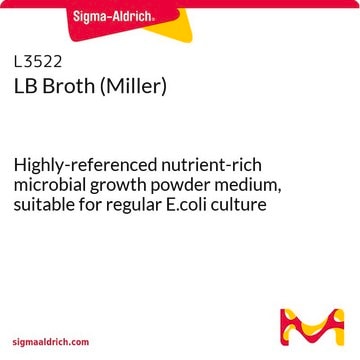L3147
LB Broth with agar (Miller)
Highly-referenced nutrient-rich microbial growth powder medium with Agar, suitable for regular E.coli culture.
Sinónimos:
Luria Agar, Luria Bertani agar, Miller’s LB agar, lysogeny broth agar
About This Item
Productos recomendados
grade
for molecular biology
sterility
non-sterile
form
powder
composition
Agar, 15 g/L
NaCl, 10 g/L
Tryptone, 10 g/L
Yeast Extract, 5 g/L
technique(s)
microbiological culture: suitable
pH
6.8-7.2(4% solution)
application(s)
food and beverages
microbiology
storage temp.
room temp
suitability
nonselective for Escherichia coli
nonselective for coliforms
General description
Application
Features and Benefits
- Easy scale-up using larger package sizes
- A budget-friendly alternative to pre-poured plates
- Standard formulation
Preparation Note
2. Heat to boiling while stirring to dissolve.
3. Autoclave for 15 minutes at 121°C.
4. Cool to 50°C prior to dispensing into sterile petri dishes.
To prepare the medium of Luria and Burrows: Add 1 g glucose to medium and proceed with preparation instructions above.
To prepare the medium of Luria, Adams and Ting (also known as LC agar): Aseptically add 25 ml of sterile 0.1 M calcium chloride after autoclaving.
Reconstitution
related product
Storage Class
11 - Combustible Solids
wgk_germany
WGK 3
flash_point_f
Not applicable
flash_point_c
Not applicable
Certificados de análisis (COA)
Busque Certificados de análisis (COA) introduciendo el número de lote del producto. Los números de lote se encuentran en la etiqueta del producto después de las palabras «Lot» o «Batch»
¿Ya tiene este producto?
Encuentre la documentación para los productos que ha comprado recientemente en la Biblioteca de documentos.
Los clientes también vieron
Artículos
Genetic engineering enables large-scale expression and isolation of recombinant proteins for research purposes.
Genetic engineering enables large-scale expression and isolation of recombinant proteins for research purposes.
Genetic engineering enables large-scale expression and isolation of recombinant proteins for research purposes.
Genetic engineering enables large-scale expression and isolation of recombinant proteins for research purposes.
Protocolos
General protocols for growth of competent cells in microbial medium.
Nuestro equipo de científicos tiene experiencia en todas las áreas de investigación: Ciencias de la vida, Ciencia de los materiales, Síntesis química, Cromatografía, Analítica y muchas otras.
Póngase en contacto con el Servicio técnico












